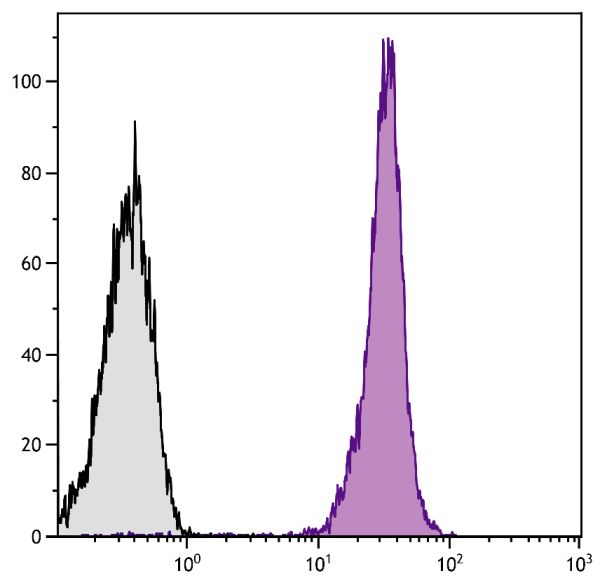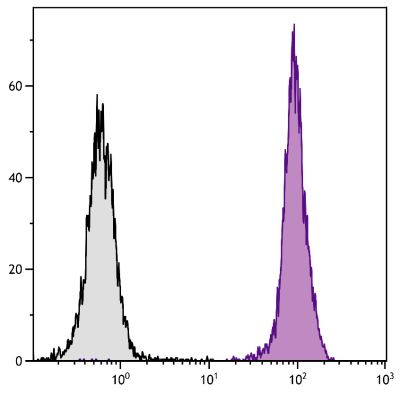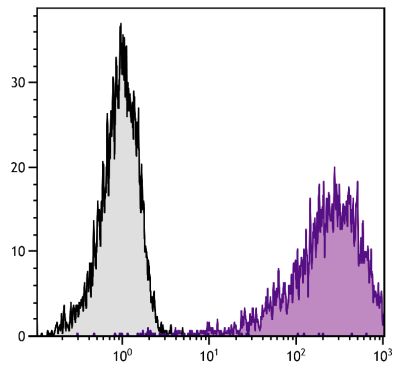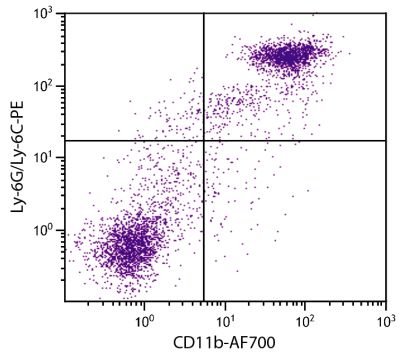Mouse Anti-Mouse CD45.2-PACBLU (104)
Cat. No.:
1800-26
Pacific Blue™ Anti-Mouse CD45.2 antibody for use in flow cytometry assays.
$230.00


| Clone | 104 |
|---|---|
| Isotype | Mouse (SJL) IgG2aκ |
| Isotype Control | Mouse IgG2a-PACBLU (HOPC-1) |
| Specificity | Mouse CD45.2 |
| Alternative Names | Ly-5.2, LCA, SJL, T200 |
| Description | The CD45 antigen is an essential regulator of leukocyte activation and development and is now known to be a protein tyrosine phosphatase, e.g., CD45 is able to dephosporylate the Src family of protein kinases. This activity is known to be required for signal transduction induced by T and B cell antigen receptor engagement, cytokine signaling, and Fc receptor stimulation. The functional state of CD45 also has a pronounced effect on lymphocyte development. CD45 exists in multiple forms, such as the restricted variants (CD45R; see companion products 1660, 1665, 1675, 1685 and 1820) and as allelic forms CD45.1 (Ly-5.1) and CD45.2 (Ly-5.2). The specificity of antibodies to CD45.1 and CD45.2 has been exploited in studies where resolution of donor and recipient cells is essential, such as in gene therapy or bone marrow transplantation. The monoclonal antibody 104 recognizes CD45 (leukocyte common antigen) on all leukocytes of mouse strains expressing the CD45.2 allotype (e.g., A, AKR, BALB/c, CBA/Ca, CBA/J, C3H/He, C57BL, C57BR, C57L, C58, DBA/1, DBA/2, NZB, SWR, 129). |
| Immunogen | B10.S mouse thymocytes and splenocytes |
| Conjugate | PACBLU (Pacific Blue™) |
| Buffer Formulation | Phosphate buffered saline containing < 0.1% sodium azide |
| Clonality | Monoclonal |
| Concentration | 0.5 mg/mL |
| Volume | 0.2 mL |
| Recommended Storage | 2-8°C; Avoid exposure to light |
| Trademark Information | Pacific Blue™ is a trademark of Thermo Fisher Scientific, Inc. or its subsidiaries |
| Applications |
Flow Cytometry – Quality tested 2-7 Immunohistochemistry-Frozen Sections – Reported in literature 2,3 |
| RRID Number | AB_2795323 |
| Gene ID |
19264 (Mouse) |
| Gene ID Symbol |
Ptprc (Mouse) |
| Gene ID Aliases | loc; B220; Cd45; L-CA; Ly-5; T200; CD45R; Lyt-4 |
| UniProt ID |
P06800 (Mouse |
| UniProt Name |
PTPRC_MOUSE (Mouse) |
Documentation
Certificate of Analysis Lookup
Enter the Catalog Number and Lot Number for the Certificate of Analysis you wish to view
- 1. Shen F. Monoclonal antibodies to mouse lymphocyte differentiation alloantigens. In: Hämmerling GJ, Hämmerling U, Kearney JF, editors. Monoclonal Antibodies and T-Cell Hybridomas: Perspectives and Technical Advances. Amsterdam: Elsevier/North-Holland Biomedical Press; 1981. p. 25-31. (Immunogen)
- 2. Llodrá J, Angeli V, Liu J, Trogan E, Fisher EA, Randolph GJ. Emigration of monocyte-derived cells from atherosclerotic lesions characterizes regressive, but not progressive, plaques. Proc Natl Acad Sci USA. 2004;101:11779-84. (FC, IHC-FS)
- 3. Biot C, Rentsch CA, Gsponer JR, Birkhäuser FD, Jusforgues-Saklani H, Lemaître F, et al. Preexisting BCG-specific T cells improve intravesical immunotherapy for bladder cancer. Sci Transl Med. 2012;4:137ra72. (FC, IHC-FS)
- 4. Angeli V, Llodrá J, Rong JX, Satoh K, Ishii S, Shimizu T, et al. Dyslipidemia associated with atherosclerotic disease systemically alters dendritic cell mobilization. Immunity. 2004;21:561-74. (FC)
- 5. Lapter S, Livnat I, Faerman A, Zipori D. Structure and implied functions of truncated B-cell receptor mRNAs in early embryo and adult mesenchymal stem cells: Cδ replaces Cμ in μ heavy chain-deficient mice. Stem Cells. 2007;25:761-70. (FC)
- 6. Pevsner-Fischer M, Morad V, Cohen-Sfady M, Rousso-Noori L, Zanin-Zhorov A, Cohen S, et al. Toll-like receptors and their ligands control mesenchymal stem cell functions. Blood. 2007;109:1422-32. (FC)
- 7. Morad V, Pevsner-Fischer M, Barnees S, Samokovlisky A, Rousso-Noori L, Rosenfeld R, et al. The myelopoietic supportive capacity of mesenchymal stromal cells is uncoupled from multipotency and is influenced by lineage determination and interference with glycosylation. Stem Cells. 2008;26:2275-86. (FC)
See All References






